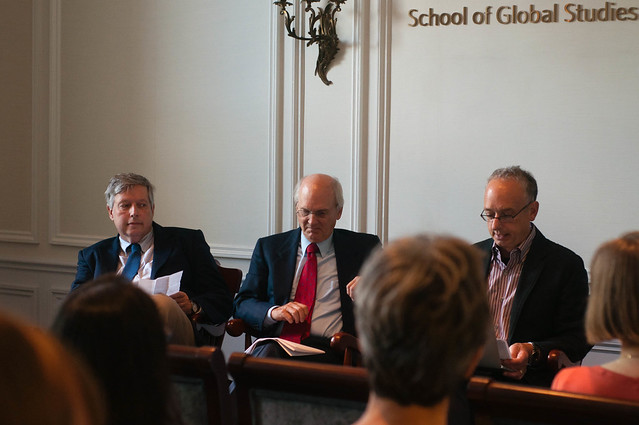Event Highlights: Break Up of Britain? BU Professors Discuss the Scottish Referendum
On Monday, September 22, following the historic referendum on independence in Scotland that brought record numbers of Scottish voters – including large numbers of 16-and 17-year-olds – to the polls, we hosted a panel discussion on the campaign that brought Britain to the brink of break up. Participating in the discussion of the referendum and its implications – not only for the UK but for other countries with active separatist movements – were Graham Wilson, Chair of the Department of Political Science, James A. Winn, Warren Distinguished Professor of English and Director of the Center for the Humanities, and Erik Goldstein, Professor of History and International Relations.
James Winn opened the discussion with a historic overview of the relationship between the English and the Scots. Long separate kingdoms, England and Scotland have shared a monarch since 1603, when James VI inherited the English throne from Queen Elizabeth I. When Anne acceded to the throne in 1702, motivated by a desire to quell disagreements over succession – and to prevent accession of her Roman Catholic half brother to Scottish throne – she pushed for deeper political integration. The United Kingdom was formed as a result of the acts of union of 1706 and 1706, guaranteeing the succession of a Protestant Hanover to throne and giving Scotland access to colonial markets. Despite early hostilities to the merger, well documented by Daniel Defoe, Anne’s vision has proved salutary. The referendum, Winn argued, was an attempt to stir up nationalism on racial grounds, ignoring the fact that the English and the Scots are, in fact, one people and have been for at least three centuries.
Erik Goldstein, noting that Scotland had planned to keep the Queen, pointed out that a number of other issues remained unresolved, including what currency an independent Scotland would use. He also highlighted the decisive last minute role played by Gordon Brown in his passionate defense of the union speech on the eve of the referendum. He said the question now is how to devolve the government, given the vote to keep the union, and the fact that Scotland represents only 8.3% of the population of the United Kingdom.
Graham Wilson, in his remarks, compared Scottish election results in 1955 and 2010, charting the rise of the Scottish National Party (SNP). He attributed much of the success of the independence campaign to the framing of the issue – “devo max,” or full-fiscal autonomy for Scotland within the UK was not presented as an alternative. Cameron thought when presented with the single question on separation, Scots would be more likely to vote no, but found himself consistently out-maneuvered by Tony Salmund, as the pro-independence movement gained ground and poll margins tightened. In the end, the outcome was more decisive than the polls had indicated, and Wilson speculated why this might have been the case. Why, he asked, were the bookies, who predicted the defeat, more correct than the opinion polls? He answered that it likely has to do with their framing of the question, not as “How are you going to vote?” but rather, “Which side is going to win?”
All of the speakers agreed that while the rejection of independence has ended one debate, it raises several others, most immediately about devolution of power in the UK. During the question and answer session, a number of other issues were discussed. While the record high turn out (84.5%) has led to characterizations of the referendum as a triumph for the democratic process, Manjari Miller noted that by encouraging separatist vs. national aspirations, it has been viewed by many in India as as a failure of democracy.
Thumbnail image from Yes Scotland’s first annual independence rally by Phyllis Buchanan

